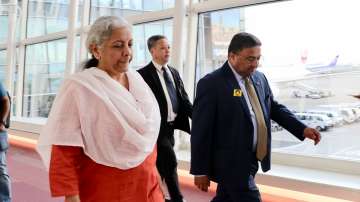Sitharaman in Japan: Union Finance Minister Nirmala Sitharaman reached Japan on a two-day visit to attend the Group of Seven (G7) meeting. Earlier on Wednesday, she was welcomed by Indian Ambassador to Japan and Marshall Islands, Sibi George after she arrived at Haneda Airport in Tokyo.
According to the finance ministry, the senior leader is on an official two-day visit to Niigata, Japan, for a 'Dialogue with partner countries' at the G7 Finance Ministers and Central Bank Governors meeting tomorrow (May 12).
During her visit, Sitharaman will also have multilateral and bilateral engagements with her counterparts, besides a roundtable meeting with business leaders and investors, the finance ministry said in a tweet.
The office-bearers of Tokyo Tamil Sangam also called on the Union finance minister during her two-day visit, according to a tweet from the office of the finance minister's office. Tokyo Tamil Sangam is a non-profit organisation that aims to promote the Tamil language and culture in Japan's capital.
ALSO READ: PM Modi to attend Quad Leaders Summit in Australia next month
Japan FM to chair G7 meeting
The G7 meeting will be chaired by Japanese Finance Minister Shunichi Suzuki and the Governor of the Bank of Japan Kazuo Ueda. During the meeting of the Financial Stability and Development Council (FSDC) held in New Delhi on Monday, FM Sitharaman said regulators must take appropriate and timely action to mitigate any vulnerability and strengthen financial stability.
She said regulators should maintain a constant vigil as ensuring financial sector stability is a shared responsibility of the regulators. The heads of the regulators of the G7 member countries will be here during the meeting.
India-Japan relations
The relations between India and Japan have a long history rooted in spiritual affinity and strong cultural and civilizational ties. Throughout the various phases of history since contacts between India and Japan began some 1400 years ago, the two countries have never been adversaries. Bilateral ties have been singularly free of any kind of dispute –ideological, cultural or territorial.
A transformational development in the economic history of India was Suzuki Motor Corporation’s path-breaking investment in India in the early 1980s which revolutionized the automobile sector, bringing in advanced technology and management ethics to India.
A test of the reliability of Japan as a friend was witnessed in 1991, when Japan was among the few countries that unconditionally bailed India out of the balance of payment crisis.
(With ANI inputs)
Latest World News
